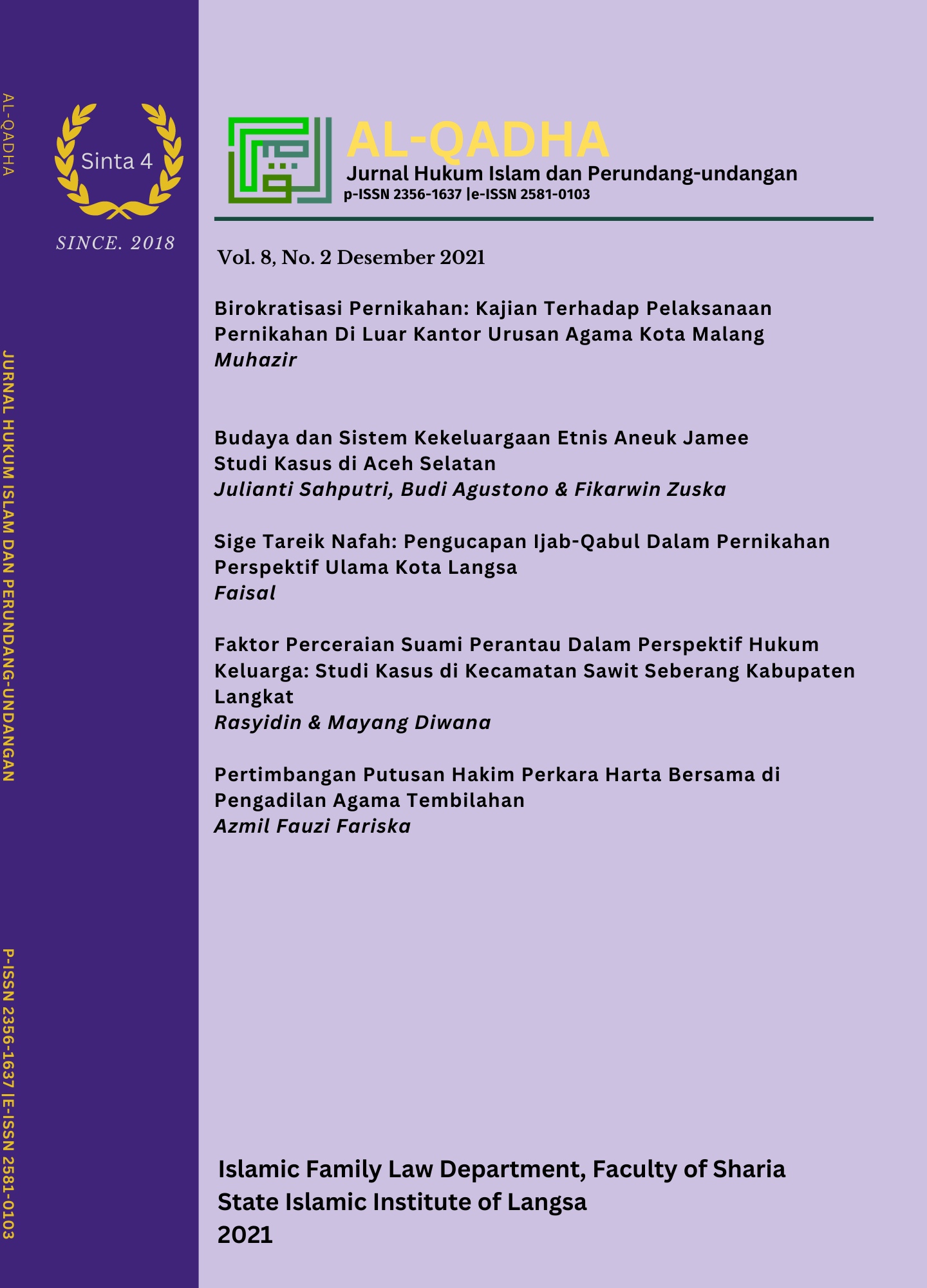Main Article Content
Abstract
There is a phenomenon that occurs in Langsa City regarding the understanding of some Imum Gampong (Village Imams) and some community leaders who argue that in the pronunciation of the ijab-qabul lafadz spoken by the bride's guardian or by the prospective groom, it must be sige tareik nafah. This sige tareik nafah, as said by Tengku imum gampong (village priest), is very burdensome for the prospective groom or guardian, because in addition to the long sentences, nervousness becomes an obstacle and interferes with concentration in pronouncing consent, so many feel afraid before the implementation of the marriage contract, such rules or customs seem too excessive. This article uses the sociology of law theory. The results of the study show that the scholars of Langsa City in this matter are a habit or custom that develops in society, so that the gampong priests understand it as a legal stipulation, then in pronouncing the ijab-qabul it must be with sige tareik nafah, otherwise the marriage is invalid. . Then this sige tareik nafah is an addition to the understanding of the village priest about the prohibition of fashl in pronouncing the ijab-qabul and the qabul-qabul must be in one assembly.
Keywords
Article Details
References
- Abdallah, Ulil Abshar. Menolak Tunduk Pada Teks. Yogyakarta: eL-SAQ Press, 2007.
- Acmad Kuzari. Nikah Sebagai Perikatan. 1st ed. Jakarta: Raja Grafindo Persada, 1995.
- Agama, Direktorat Pembinaan Badan Peradilan. Kompilasi Hukum Islam Di Indonesia. Jakarta: Direktorat Pembinaan Badan Pjheradilan Agama, 1992.
- Amir Syarifuddin. Hukum Perkawinan Islam Di Indonesia. Edited by Kencana. Jakarta, 2006.
- Anto. Wawancara Imum Gampong Sidodadi Kecamatan Langsa Lama, 07 Agustus 2019, n.d.
- Astqolani, Ibnu Hajar al. Bulughul Maram. Surabaya: Darul Ilmu, n.d.
- Azhar. “Wawancara Kepala Kua Kec. Langsa Barat, Agustus 08, 2019,” n.d.
- Ierham Zakaria. Wawancara Kepala KUA Kec. Langsa Baro, 09 Agustus 2020.
- Jaziri, Abdul Rahman al. Kitab Al Fiqh Al Mazahib Al Arba’ah. Beirut: Dar al Fikr, 2008.
- Ka’bah, Rifyal. Politik Dan Hukum Dalam Al-Qur’an. Jakarta: Khairul Bayan, 2005.
- Muhammad Jawad Mughniyah. Fiqh Lima Mazhab. Jakarta: PT. Lentera Basritama, 2005.
- Muhammad Kamil. Al Jami’ Fi Fiqhi an Nisa’. Jakarta: Pustaka al Kautsar, 1998.
- Muhammad Syatha ad Dimyathi. I’anatut Thalibin. Beirut: al Kutub al Arabiyah, n.d.
- Murdani Muhammad. Wawancara Ketua HUDA Kota Langsa, 21 Agustus 2020.
- Nawawi, Abi Zakariya Muhyiddin bin Syaraf al. Kitab Al Majmu’. Beirut: Dar Ihya’ al Turats al Arabi, n.d.
- Rahmat Syafei. Fiqh Muamalah. Bandung, 2000.
- Ridwan Abdullah. Wawancara Imum Gampong Sungai Pauh Dan Wakil Ketua II MPU Kota Langsa, 03 Agustus 2020.
- Sabiq, Sayyid. Fikih Sunnah. PT. Al Ma’arif. Bandung: PT. al Ma’arif, 1997.
- Shalahuddin Muhammad. Wawancara Ketua MPU Kota Langsa, 03 Agustus 2020.
- Subki, Ali Yusuf as. Fiqh Keluarga. Jakarta: AMZAH, 2010.
- Syahrial. Wawancara Imum Gampong Telaga Tujoh (Pusong) Kecamatan Langsa Kota, 11 Juni 2020.
- Syawal. Wawancara Imum Gampong Telaga Tujoh (Pusong) Kecamatan Langsa Barat, 10 Juni 2020.
- Tgk. Azhar. Wawancara Kepala KUA Kec. Langsa Barat, 07 Agustus 2020.
- Usman, Zainuddin al Manji bin. Al Mumta’ Fi Syarhi Muqna’. Makkah: Makntabah al Asadi, 2003.
- Wahbah az Zuhaili. Fiqh Al Islami Wa Adillatuhu. Damaskus: Dar al Fikr, 2006.
- Zainuddin bin Abdul Aziz al Malibary. Fathul Mu’in. Jakarta: Dar al Kutub al Islamiyah, 2010.
